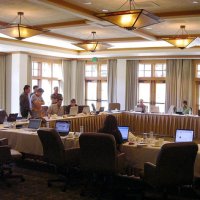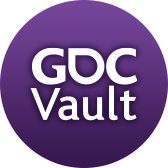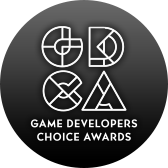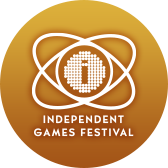[In her Bosslady Blog update for the 2012 cycle, Game Developers Conference events GM Meggan Scavio details the extent of the Advisory Board's work honing next March's Main Conference lectures.]
Although you may think there's a few months to go before GDC 2012, we're already well underway in working to hone lectures for the show. Here's what happened so far...
Three weeks ago, the Game Developers Conference 2012 Main Conference call for submissions came to a close. By midnight, September 6, a grand total of 722 session proposals were in the system.
During the following two weeks, multiple members of the main GDC advisory board, including almost 20 notables like Clint Hocking (Far Cry 2), Soren Johnson (Civilization IV), Mark Cerny (Marble Madness), and a host of other discipline-specific experts reviewed, commented on and rated each of these submissions.
Along the way, the board members read the abstract, and looked at the attendee evaluation history of each speaker (The GDC keeps all speaker ratings and attendee comments dating back to GDC 2000, and uses them to vet speakers). They also reviewed the supporting material that was uploaded with the submission (slides, videos, PDFs, audio files, all stored thanks to the new GDC submission and rating tool we've created this year). And they followed the URLs provided and used their extensive industry knowledge and online information to evaluate each submission.
Then last week, the 20+ board members all flew into the San Francisco Bay Area and gathered at a hotel for three days to select the submissions that would move forward. During two full day meetings, each track (Audio; Business, Marketing & Management; Game Design; Production; Programming; Visual Arts) met independently to discuss the submissions within their track.
The submissions were sorted by average board member rating in descending order, and discussed one by one starting from top rated. It's here that the track members determined which submissions would move on to what we call 'Phase Two'.
Following discussion of the top-rated talks, the Boards then did a round
of "saves", where each board member argued to save one or more of the
lower rated submissions they felt should go to Phase Two anyhow. Once
that process was complete, the board took stock of lectures that moved
on, and discussed what was still needed to round out the program.
From this came a list of specific, carefully invited talks that GDC
staff members will spend the next few months sourcing. And at the end of
each day, the full board gathered into one room and each track
presented their selections to the group, giving everyone an opportunity
to comment on the choices made.
Then we ate, drank and played poker. It's tradition. This year, we tried Texas Hold 'Em using the special GDC playing cards given out each year as speaker gifts. They include photos of the top rated speakers from the previous year. But it proved too weird- nobody wanted to lose to a Neil Druckmann, John Sharp, Kellee Santiago, Lee Perry, and Brenda Brathwaite diamond flush. Go figure.
So what happens next? Maybe it's time to explain Phase Two. We began
using this process several years ago. The purpose was to steer each
initially accepted talk in a direction that would provide the most
takeaway for GDC attendees. It would also help solve the semi-frequent
problem of a given talk not completely reflecting its written
description, or not dipping into enough depth on the subject. All
submitters were required to submit more information in Phase Two. More
often than not, we would request the full slide presentation for board
review.
But there was a lot of friction in this process. Submitters were given
written notes and then required to complete the full PowerPoint
presentation for review. The board would frequently ask for a variety of
tweaks and revisions, creating an overly fluid back and forth before
ultimately accepting or declining the submission. In fact, the 'Phase
Two' concept sometimes turned into a 7 or 8 phase process, and became
frustrating for the submitters.
In order to avoid that, we're using a new methodology this year. Each
Phase Two submitter now has an advisory board mentor - their very own
'special friend'. Each expert Advisory Board member has been assigned a
number of submitters in topics relevant to them, and the mentor's role
will be to guide the talk toward acceptance in a very direct line.
Naturally,
there is still no absolute guarantee that submissions in Phase Two will
be accepted, but we're hoping that with a one-on-one mentorship, we'll
get more top quality talks, and submitters will better understand the
hows and whys of making lectures with great takeaway and inspiration.
So right now, after a really successful GDC Board Meeting (lots of talks
we're itching to get fleshed out and accepted so we can tell you all!),
we're at the start of Phase Two. Letters to GDC submissions not
selected are in the process of being emailed, followed by a round of
Phase Two notifications.
Those people will then receive
individual introductions to their mentor and if all goes well, about a
month later, a GDC talk will be born. Get ready to sign the
congratulations card to the happy parent (and congratulations if it's
you!)



